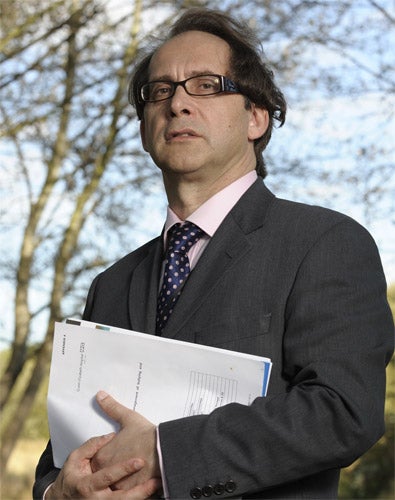Consultant 'victimised for exposing cost-cutting'
Doctor says NHS trust branded him a 'trouble-maker' when he spoke out

Your support helps us to tell the story
From reproductive rights to climate change to Big Tech, The Independent is on the ground when the story is developing. Whether it's investigating the financials of Elon Musk's pro-Trump PAC or producing our latest documentary, 'The A Word', which shines a light on the American women fighting for reproductive rights, we know how important it is to parse out the facts from the messaging.
At such a critical moment in US history, we need reporters on the ground. Your donation allows us to keep sending journalists to speak to both sides of the story.
The Independent is trusted by Americans across the entire political spectrum. And unlike many other quality news outlets, we choose not to lock Americans out of our reporting and analysis with paywalls. We believe quality journalism should be available to everyone, paid for by those who can afford it.
Your support makes all the difference.A leading cancer consultant who repeatedly raised concerns about the health and safety of patients at a London hospital will claim today that he was victimised by managers and had his warnings ignored.
Ramon Niekrash, 50, a consultant urologist at the Queen Elizabeth Hospital in south-east London, alleges that warnings he made in a series of letters about chronic cost-cutting led to him being branded a "trouble-maker" and excluded from the hospital last year.
In his whistleblowing employment case against the Queen Elizabeth Hospital NHS Trust, Mr Niekrash will tell a tribunal that the reduction of specialist nurses and closure of the specialist urology ward damaged the care of patients.
Mr Niekrash also questioned the hospital's ability to provide a safe service, and made further allegations of widespread bullying of other staff in the Surgical Directorate when the hospital tried to cut costs.
Queen Elizabeth, in Woolwich, reopened in 2002 after a £93m rebuilding scheme funded by a Private Finance Initiative (PFI), but declared itself technically insolvent in 2006 after auditors said it was heading for a deficit of £100m by 2008-09. This year it merged with two other hospitals to form the South London Healthcare NHS Trust.
Ahead of today's employment tribunal hearing in Croydon, Mr Niekrash told The Independent: "I would have been failing in my duty as a doctor if I had not brought the matters of patient care and safety to the attention of trust management. However, as a result of so doing I have suffered the consequences and been perceived as a difficult person and trouble-maker."
He added: "I believe I have suffered the consequences of having raised those issues in a trust management system, which put cost savings above the issues of patient care. The issues I raised have still not been resolved and have manifested. I am saddened by the slur that this has caused on my reputation and the perception of me within the trust, which continue to have an impact upon me."
Mr Niekrash, head of urological cancer between January 2002 and November 2007 and president of the South-Eastern Urostomy Association, was responsible for identifying problems and suggesting improvements to the service. From 2005 he wrote letters to the trust's management laying out his concerns about the health and safety of patients. He claims the "vast majority" of these went unanswered, which led him to write further letters to "a wider consultant audience" to bring proper attention to his concerns.
His lawyer, Arpita Dutt, of employment law firm Russell Jones & Walker, said her client had been victimised for acting in the public interest.
She said: "The NHS's stance on whistleblowing is clear, but if someone at such a senior level can be treated like this, what message does that send to other employees with concerns to raise?
"The decision to exclude Mr Niekrash was high-handed and unjustified, and has had an ongoing adverse impact on his reputation, practice and his health. Like many similar whistleblowing claims, the focus of attention was on the messenger rather than the important and unambiguous message being conveyed."
A spokesman for the hospital said the trust would fight the case: "He [Mr Niekrash] makes a number of claims against the Queen Elizabeth Hospital... the trust denies all the claims and will contest them robustly."
Join our commenting forum
Join thought-provoking conversations, follow other Independent readers and see their replies
Comments